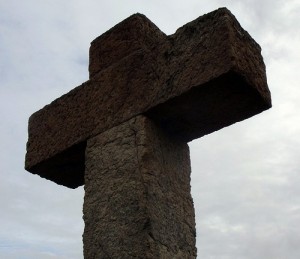Today, Tara and I sang in a choral concert at Memorial Presbyterian Church in Midland. The concert featured a 45-minute piece of music entitled “Requiem,” written by the 20th Century French composer Maurice Durufle. It’s a beautiful piece that is very familiar to me, since I sang it with a different choir a decade ago. Singing along with a hundred other singers, a small orchestra, and a recently installed pipe organ was a tremendous experience. There’s something about religious choral music that speaks to my heart in powerful ways.
Veni, Veni Emmanuel
This Christmas Eve, Pastor David led us in a reflection on an ancient Christian hymn, “O Come, O Come, Emmanuel,” which has lyrics that date back to at least the 9th Century. The seven stanzas of this hymn contain a powerful message that you won’t want to miss. Listen in to this message and celebrate the great truth that Jesus Christ is indeed here with us – and that he will be here again soon!
You can read the Latin and English lyrics by downloading this PDF file, which shows the back side of tonight’s order of worship: VeniVeni.pdf
Sing Lullaby
But Mary treasured up all these things and pondered them in her heart. (Luke 2:19 NIV)
What if Mary, the mother of Jesus, had known the entire course of her son’s life at the moment of his birth? What if she knew that his life and ministry would spark a religious conflict in Jerusalem resulting in his execution? What if she could grasp the prophetess Anna’s words, “and a sword will pierce your own soul too” (Luke 2:35b NIV)? What if she could see the glory of Jesus’s resurrection, the promise of eternal life, even as he lay in her arms as a newborn?
Old-Fashioned Hymn Sing
Last night, I had the privilege of leading a unique kind of experience to open this year’s 120th annual St. Louis Campmeeting: an “old-fashioned hymn sing.” Pastor Jim Sirks (from Battle Creek) and I played our guitars to accompany a crowd of over 100 that gathered in the old tabernacle on the St. Louis campgrounds. This event kicked off the campmeeting in stellar fashion, and I’d like to share a few reflections with you about the evening.
 In the Church of God, we have a diverse collection of songs. For this event, I selected sixteen of our “heritage hymns,” songs written by some of the earliest people in our movement. I grouped these sixteen into four groups of four, each group revolving around a different theme: Songs of Praise, Songs of Gratitude, Songs of Testimony, and Songs of Commitment. There may be other types of songs in our heritage, but even these four groups reveal a wide variety of songs in our tradition that can be used for any occasion. (By the way, we sang all the verses of all sixteen songs, and the whole event lasted only an hour.)
In the Church of God, we have a diverse collection of songs. For this event, I selected sixteen of our “heritage hymns,” songs written by some of the earliest people in our movement. I grouped these sixteen into four groups of four, each group revolving around a different theme: Songs of Praise, Songs of Gratitude, Songs of Testimony, and Songs of Commitment. There may be other types of songs in our heritage, but even these four groups reveal a wide variety of songs in our tradition that can be used for any occasion. (By the way, we sang all the verses of all sixteen songs, and the whole event lasted only an hour.)
In the Church of God, we have people who can sing four part harmony. The acoustics of the old tabernacle – a small, open-air, wooden building with lots of hard surfaces – added to the musical experience produced by two acoustic guitars and a hundred voices. These were songs that people knew and wanted to sing. And many sang the parts (alto, tenor, bass) they have learned and have known for many years. Singing in harmony is a gift from God, and it does something spiritually to connect people together in worship. Worship (including but not limited to singing) is a communal activity, something we do together and not alone. (Remember that electronic amplification is less than a century old – newer than many of the songs we sang last night!)
In the Church of God, we sing what we believe. In late 19th Century America, church music was an instructional tool that helped people learn the contours of our faith. So much of our early heritage music contains a tremendous amount of theology. While we did not reflect on the theology of all sixteen songs last night, I did highlight one hymn in particular: “The Bond of Perfectness” by D.S. Warner. One of my seminary professors, Dr. Gil Stafford (previously pastor of East Ashman Church of God in Midland), once said that this was the epitome of Church of God theology in lyrical form, because it blends together our understandings of holiness and unity so beautifully:
How sweet this bond of perfectness, the wondrous love of Jesus;
A pure foretaste of heaven’s bliss, oh, fellowship so precious!Refrain:
Oh, brethren, how this perfect love unites us all in Jesus!
One heart, and soul, and mind we prove the union heaven gave us.Oh, praise the Lord for love divine that binds us all together;
A thousand chords our hearts entwine, forever and forever.“God over all and in us all,” and through each holy brother;
No pow’r of earth or hell, withal, can rend us from each other.Oh, mystery of heaven’s peace! Oh, bond of heaven’s union!
Our souls in fellowship embrace, and live in sweet communion.
These reasons, and several more, are why I am committed to having us sing at least one of our heritage hymns in each of our Sunday morning worship services. Which are your favorites?
–Pastor David
Beneath a Veil
On this Good Friday, I’d like to share a hymn with you that has helped me center myself on the spiritual meaning and depth of Jesus’s sacrifice. The hymn is entitled “Thee We Adore,” and the English text below is translated from Thomas Aquinas, an important 13th century priest. Tara and I found this hymn through one of the area choirs in which we sing; the tune we sang (by a composer named Candlyn) is hauntingly beautiful.
Thee we adore, O hidden Savior, thee,
Who in thy sacrament art pleased to be;
Both flesh and spirit in thy presence fail.
Yet here thy presence we devoutly hail.

Thomas Aquinas was instrumental in the philosophical arguments behind the Catholic doctrine called “transsubstantiation” – that is, that the bread and wine of the Lord’s Supper literally become the body and blood of Jesus when we share at his table. We in the Church of God do not believe this happens, but we can certainly agree that “both flesh and spirit in thy presence fail.” Being in the Lord’s presence is truly awesome.
O blest memorial of our dying Lord,
Who living bread to men doth here afford!
O may our souls forever feed on thee,
And thou, O Christ, forever precious be.
Jesus taught us that he is the Bread of Life (John 6:22-59). When we share at the Lord’s table, we are reminded that he is true food and true drink. And when we gather at the foot of the cross, we are reminded of the truth behind the meal that we share: the bread and wine remind us of the great price Jesus paid so that we might have forgiveness and relationship with him.
Fountain of goodness, Jesu, Lord and God,
Cleanse us, unclean, in thy most cleansing flood.
Increase our faith and love, that we may know
The hope and peace which from thy presence flow.
Jesu, short for Jesus, is the source of all hope and peace. His blood is a “most cleansing flood” that can wash us clean from sin through faith and love. This season is a powerful time to remember, to wash, and to remain quietly in his presence.
O Christ, whom now beneath a veil we see,
May what we thirst for soon our portion be,
To gaze on thee unveiled, and see thy face,
The vision of thy glory and thy grace.
Our hope is always for a future with Jesus Christ. When we stand at the foot of the cross, at the tomb containing Jesus’s body, we wait for a yet-to-be-revealed future. When we see the bread of the Lord’s Supper hidden beneath a cloth, we yearn for the time when we can see Christ face to face. Until then, we thirst, we hunger, we meditate, we draw close to Christ, we hold vigil at the tomb.
I’ll see you on the other side.
–Pastor David
At the Name of Jesus
The italicized hymn lyrics found below were written by Caroline M. Noel (1817-1877). I invite you to meditate on them with me.
At the name of Jesus every knee shall bow,
Every tongue confess him King of glory now;
‘Tis the Father’s pleasure we should call him Lord,
Who from the beginning was the mighty Word.
Philippians 2:1-11 teaches us that one day every knee will indeed bow at the name of Jesus. The one whom we remember in the current seasons of Lent and Resurrection is the very Word of God (John 1:1), who has existed with the Father and the Spirit from the beginning.
At his voice creation sprang at once to sight,
All the angel faces, all the hosts of light,
Thrones and dominations, stars upon their way,
All the heavenly orders in their great array.
We frequently remember Jesus as the creator of all things that we can see: the sun, moon, and stars; the trees, flowers, and oceans; the horses, dogs, and cats. Yet scripture teaches (Colossians 1:15-16) that Jesus is the creator of all things, both visible and invisible. This Jesus is the one who holds all power and authority in his hand. Nothing in this universe has power to do anything outside the scope and wisdom of the authority of Christ.
Humbled for a season, to receive a name
From the lips of sinners unto whom he came,
Faithfully he bore it spotless to the last,
Brought it back victorious when from death he passed.
This season is crucial for us as believers. We take special care to tell the story of Jesus: from Palm Sunday, through Maundy Thursday, to Good Friday, to Resurrection Sunday and beyond. Yet what a mystery it is that this is the same Jesus who created the universe! “Humbled for a season,” he took a human name through his life, death, and resurrection.
Bore it up triumphant with its human light,
Through all ranks of creatures, to the central height,
To the throne of Godhead, to the Father’s breast;
Filled it with the glory of that perfect rest.
Soon after his resurrection, Jesus ascended into heaven, where he now sits at the right hand of God the Father. Can you imagine what that ascension might have looked like? We often think of heaven as a “perfect rest”; read Hebrews 4 for a beautiful passage on that topic.
Name him, brothers, name him, with love as strong as death,
But with awe and wonder, and with bated breath;
He is God the Savior, he is Christ the Lord,
Ever to be worshipped, trusted, and adored.
“Love as strong as death” (Song of Solomon 8:6) is exactly the type of love that Jesus showed for us (John 15:12-13). Let us always remember to approach our Lord with humility, respect, and sacrificial love. The above verse is, I believe, my favorite of this hymn’s seven verses!
In your hearts enthrone him; there let him subdue
All that is not holy, all that is not true.
Crown him as your captain in temptation’s hour;
Let his will enfold you in its light and power.
In the Church of God, we call this “holiness” or “sanctification.” Those who come to believe in Jesus as Savior still have something left to experience: the complete removal of “all that is not holy/true” by the power of Christ. Our complete hearts and minds are to be turned over to the Lord, so that his will becomes the course of our lives.
Brothers, this Lord Jesus shall return again,
With his Father’s glory, with his angel train;
For all wreaths of empire meet upon his brow,
And our hearts confess him King of glory now.
Until that day, when Jesus will return in his glory, we remain faithful. Be encouraged, brothers and sisters: the story of Jesus is true, and it is Truth. Confess Christ as “King of glory” (Psalm 24) every day, and allow him to continue to transform your lives!
(Here’s a video of a choral arrangement of this hymn.)
–Pastor David
Just a Few More Days…

Can you remember Christmas when you were a child? What was it like? Did you have certain traditions that still are meaningful for you? Do you have memories of waiting for the special day?
Of course, not everyone has pleasant memories of Christmases in the past. But hopefully you do – and if you’re like me, many of your childhood memories revolve around one thing: presents! I remember seeing gifts under the tree and wondering just what might be inside the packages. Visiting grandparents gave me another round of this sense of expectation, too – more gifts to open and to share!
Here we are, just a few days before Christmas. The level of anticipation and expectation is rising every moment for today’s children (and some adults, to be fair). Why don’t we experience that kind of excitement during the rest of our lives?
One of the hymns of our faith, “I’ll Fly Away,” expresses this feeling as it relates to our hope for life beyond the grave:
Some glad morning when this life is o’er, I’ll fly away.
To a home on God’s celestial shore, I’ll fly away.
Chances are, you know the tune to that song. In fact, you might be singing it to yourself right now. Christians love to sing this song (and songs like it) because of its catchy tune, its upbeat tempo, and its message of hope. We live as people of hope, who believe that God will bring about a brighter tomorrow, who trust that Jesus will return, will raise his people up, and will live with them in glory forever.
Isn’t it hard to live with a sense of anticipation that Jesus’s return will happen soon? I think it’s certainly harder for Christians to live in expectation of that time than it is for children to live in expectation of Christmas morning. Christmas is a regular, predictable event, but the return of Christ is mysterious, unknown, perhaps distant. Yet this is part and parcel of our faith as followers of Christ: that his return is imminent, that we may see him in our lifetime, that the time is drawing near.
Just a few more weary days and then I’ll fly away.
To a land where joy shall never end, I’ll fly away.
Friends, live with expectation! Watch for signs of anticipation in the youngest among us, and learn from their example. We are people of hope! We are people who expect Christ’s return! We are people who are waiting just a few more days!
–Pastor David
Shrinking Church

It’s the week of Thanksgiving, and many of us are turning our attention to family matters and turkey feasts. Before the festivities begin, I’d like to share with you an article I found online recently. You can read the full article here; its title is “How to Shrink Your Church,” and it was written by a pastor named Tim Suttle. If you haven’t done so already, please read this brief article; it is well worth your time.
Christians seem always to be interested in growing: we want pews to be filled, classes to be well-attended, programs to blossom. I can’t lie – when I heard 150 strong voices fill our sanctuary with musical praise to God at our Community Thanksgiving Service the other day, I was thrilled and wondered what it would be like if we were to have that experience every Sunday. We are constantly concerned with our future, with the next generation of believers, with the hope for things to turn around.
What does success look like in the eyes of God? How do we know if we are doing the right things? Even Jesus told the parable of the talents, in which the two servants who doubled their resources were praised while the one who buried his in the ground was condemned. And with the bar set high (“go and make disciples of all nations,” Matthew 28:18-20), the ideal path of church success seems straightforward enough: we are successful if we grow in size, influence, energy, and so forth.
To be fair, we should be concerned with introducing people to Jesus, the one who died to forgive our sins, who gives us new life, and who walks with us through every experience. Adding people to the kingdom of God is always a priority.
Yet I believe Pastor Suttle’s core idea is also true, and I want to restate it in my own words here. Growing churches are exciting places to be, but any church – growing or otherwise – can fall under the spell of two false teachings: (1) “Feel good” Christianity, in which everything that happens makes us feel better about our lives as we have already chosen to live them, and (2) “Church growth” Christianity, in which we follow specific programs and procedures that are designed to grow the congregation, again to help us feel better about our situation.
In order to be effective and successful Christ-followers, we must remain absolutely faithful to the message of Jesus, the kingdom of God, and the scripture which points us to God. Church growth is not about fancy programs and entertainment. It is about calling ourselves and others into deep, intimate, life-changing relationship with Christ and into meaningful, sacrificial, humble service in our world.
We must pursue Christ unashamedly, which might not be too popular. After all, Jesus himself said we’d have to eat his flesh and drink his blood, and that line cost him a lot of followers. We must spend ourselves for the sake of the kingdom of God. If we find ourselves completely spent, then we are in the right position: God is the master of resurrection, and there can be no substitute for the new life he gives his people.
–Pastor David
Unelectric Church
What an experience we had last Sunday! For those of you who were not in attendance here, we experienced a major windstorm in central Michigan on Saturday evening, and around midnight the power was knocked out at the church and at various homes throughout the neighborhood. Electricity was not restored until later on Sunday afternoon, so our Sunday morning meeting was somewhat … different than normal.
We met in the Fellowship Hall for worship, because its windows let in more natural light than the sanctuary. We sang from the hymnal, and we did well without microphones. The congregation sang with tremendous vigor and energy – the strongest singing I’ve heard since Tara and I arrived last August! Several people commented afterward that the service felt like campmeeting and that this was one of the strongest services we’ve had in recent months. I tend to agree: our worship was inspired and greatly energetic, at least partially due to our “extreme” circumstances.
How accustomed we are to the convenience of electricity! And how wonderful to be reminded that our worship of the Lord depends on us, not on the setting in which we find ourselves.
Just a few weeks ago, we focused on the story from John 4 in which Jesus encounters the Samaritan woman at the well. In that passage, Jesus says that “God is spirit, and his worshipers must worship in spirit and in truth” (John 4:23, NIV). I raised this question then: what does that kind of worship look like? In a fascinating manner, I believe the Lord gave us an opportunity to experience that kind of worship this past Sunday.
Does our worship depend on light bulbs in chandeliers, lyrics projected overhead by a computer, or amplification via microphones? Does our worship depend on radiated heat, flush toilets, or coffee machines?
What do we expect when we come into the house of the Lord? Do we expect to be comfortable, or do we expect to encounter the living God?
If nothing else, I think we can benefit from this lesson: The value of our corporate worship has more to do with the attitudes of our hearts rather than with the amenities of our facility. Perhaps we should shut off the electricity once a year to remind ourselves of this truth!
–Pastor David
The Savior is Born
Merry Christmas! While I am writing these words, stockings are being hung by our chimneys with care, and children are doing everything possible to move from the “naughty” list to the “nice” list. As always, though, there is a deep, abiding reason for this season that goes beyond gift-giving and family get-togethers. Christ, the Savior, is born!